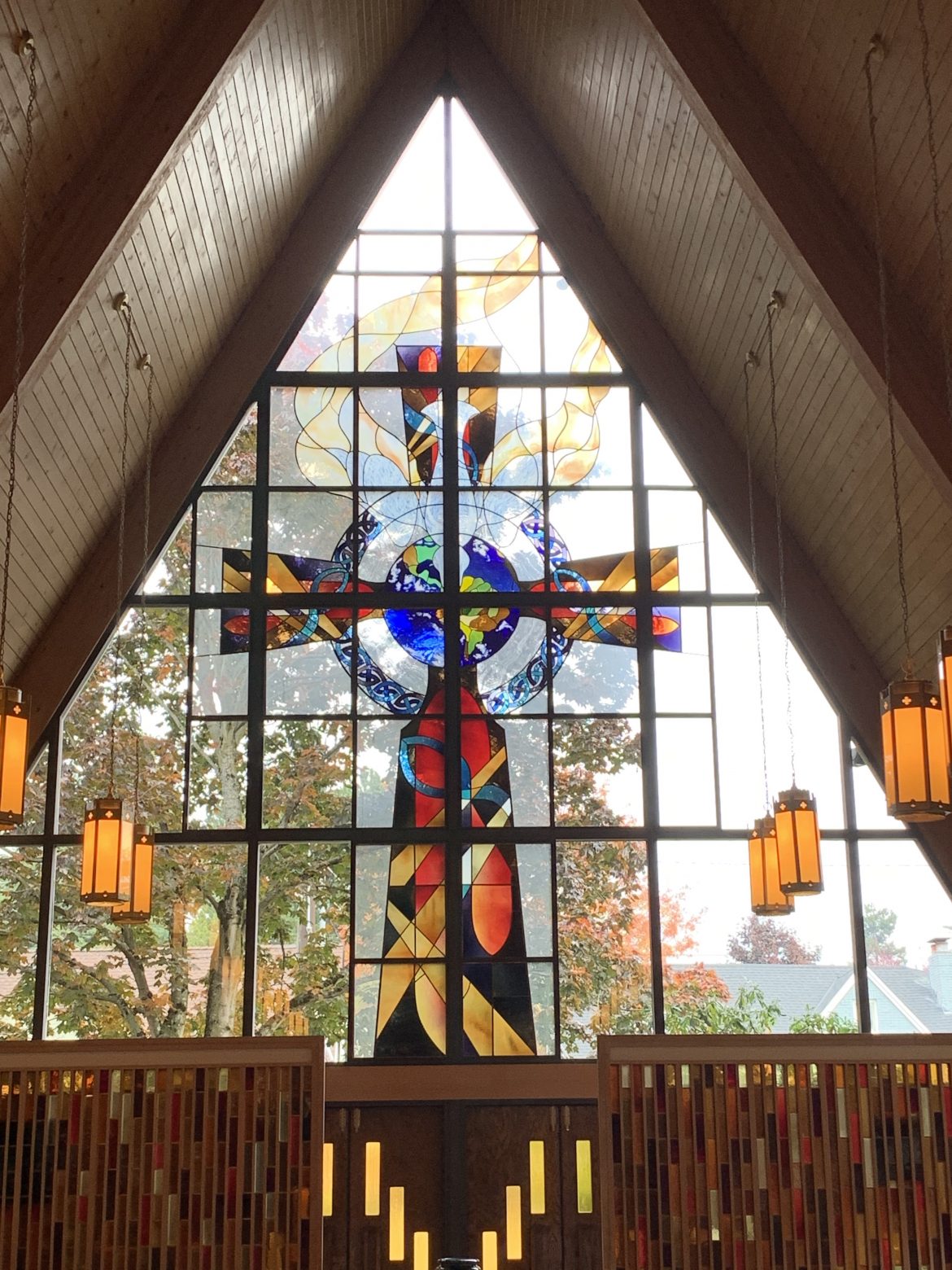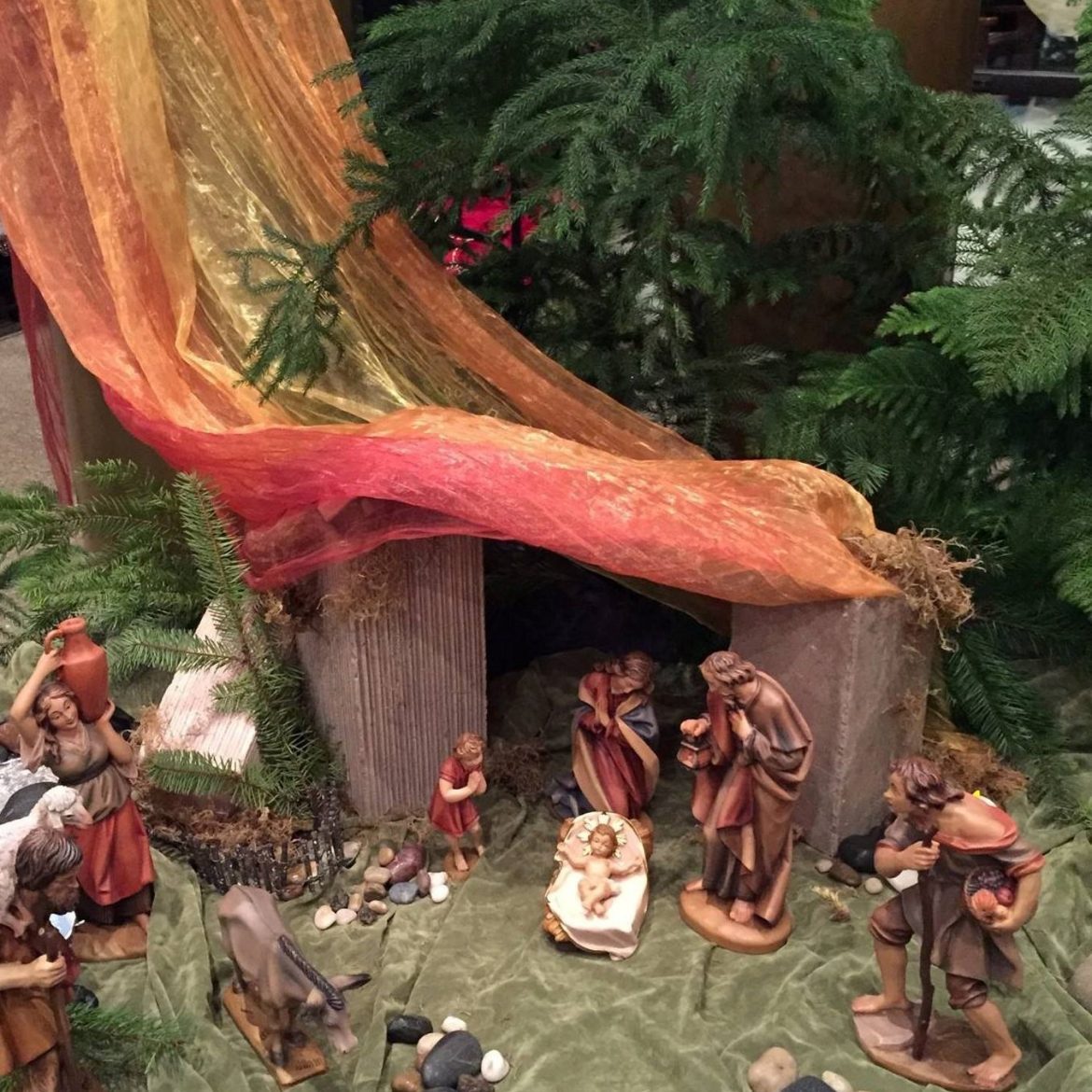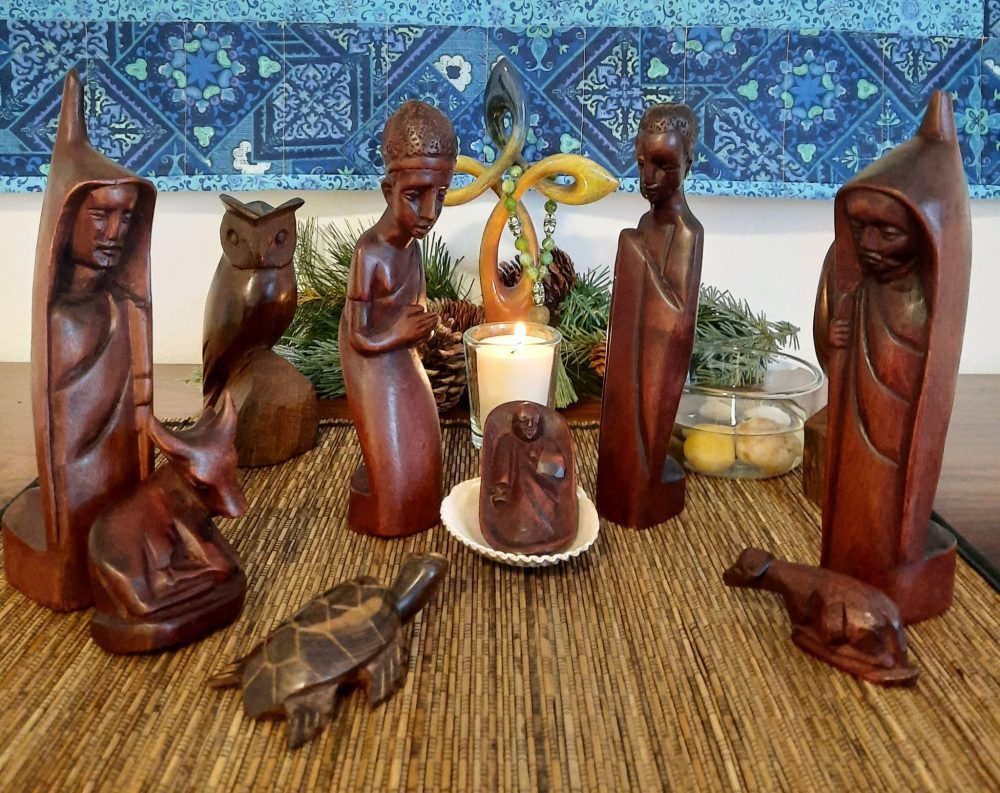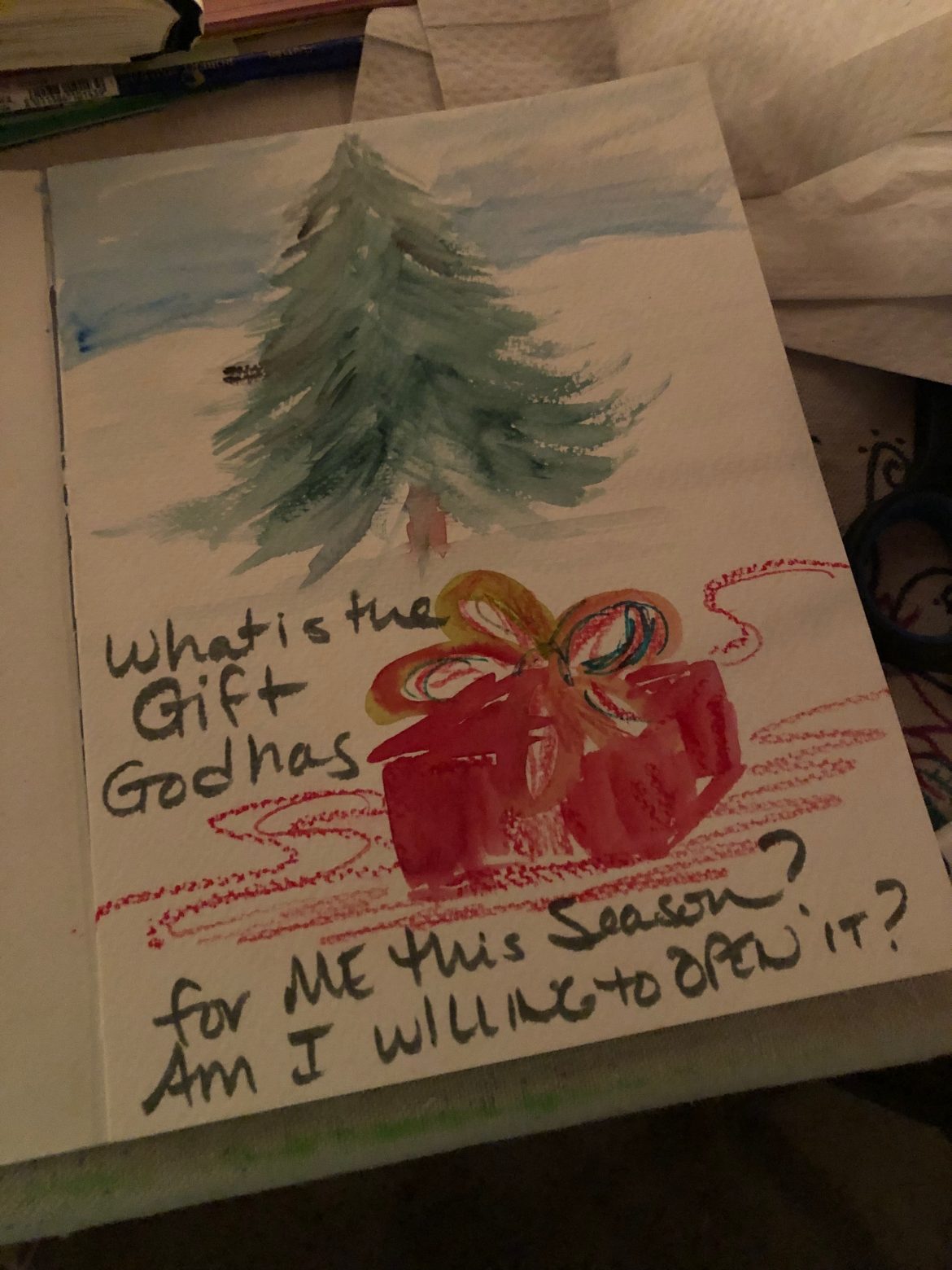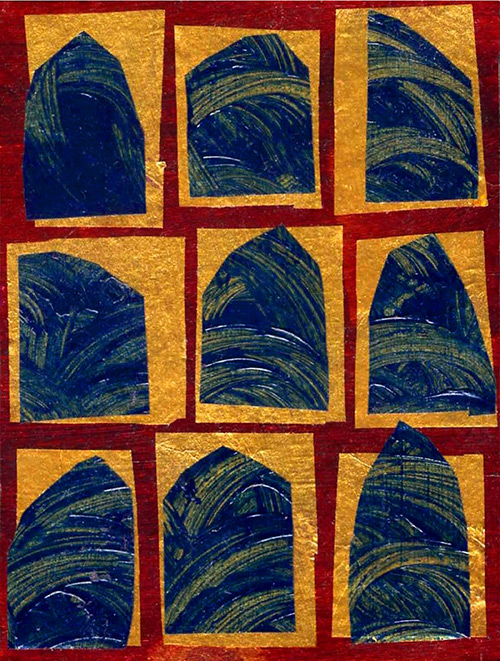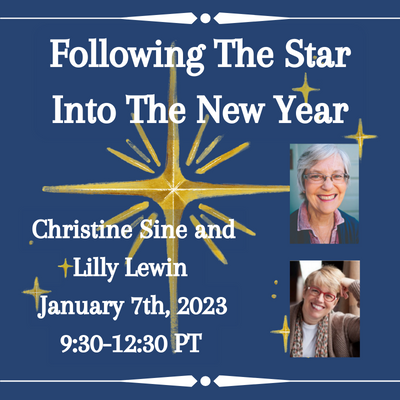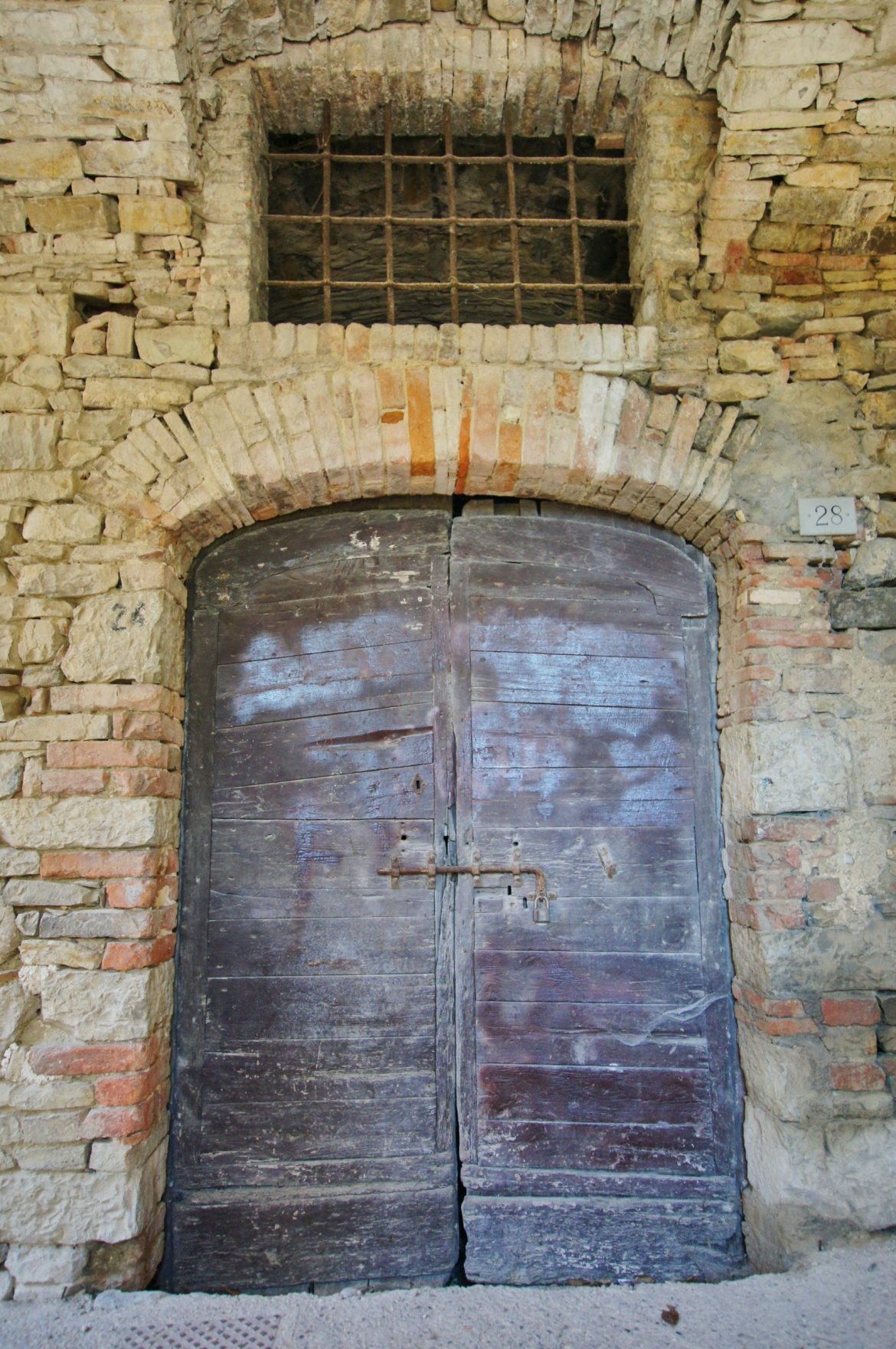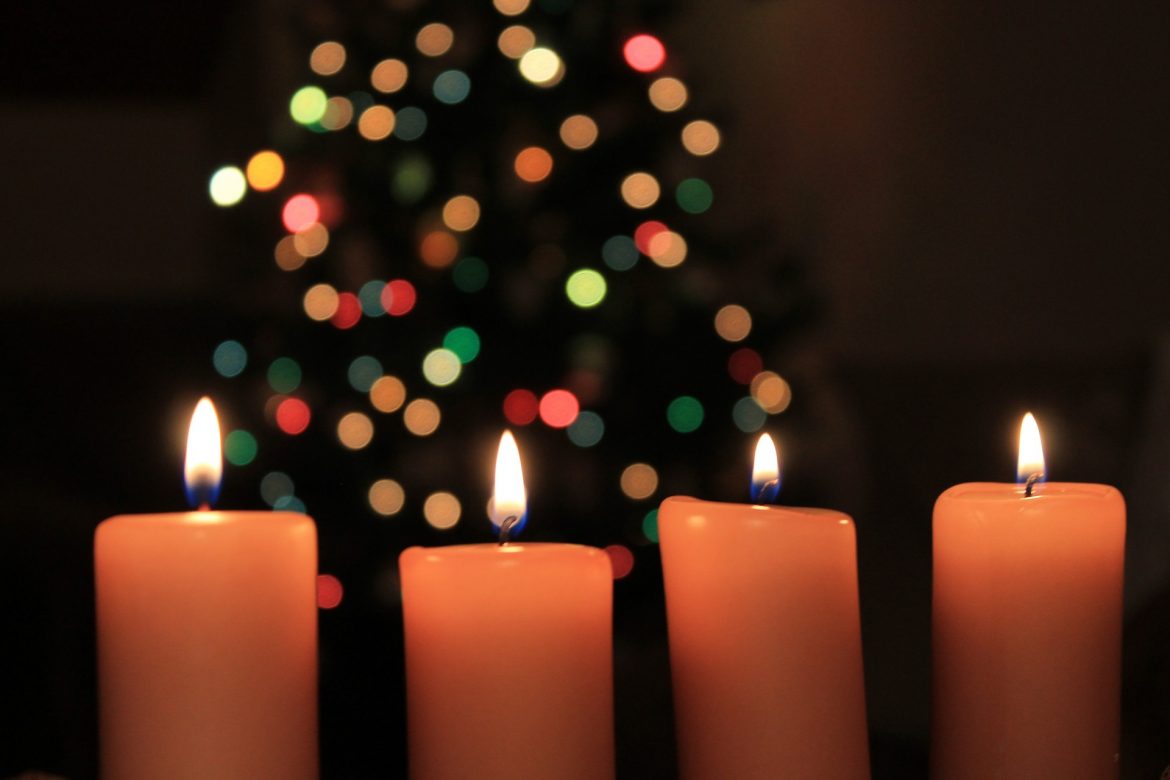by Christine Sine
Abuna Yemata Guh is a monolithic church located in the Hawzen woreda of the Tigray Region, Ethiopia. It is situated at a height of 2,580 metres (8,460ft) and has to be climbed on foot and in bare feet to reach. It is notable for its dome and beautiful wall paintings dating back to the 5th century.
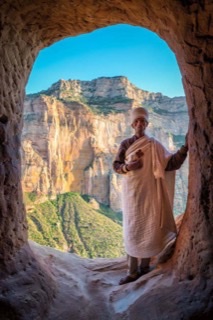
Priest at Abuna Yemata Nuh https://www.thearchaeologist.org/blog/abuna-yemata-guh-the-most-inaccessible-place-of-worship-on-earth-is-located-in-ethiopia
I am fascinated by this church and the perilous journey parishioners must take in order to worship in it. Despite the scary climb, the church is active with churchgoers climbing up the cliffs several times a week including mothers with their children on their back, pregnant women, babies and old people to attend services. Evidently young mothers bring their infants to be baptized here because they see it as being closer to heaven, more powerful and therefore closer to God than the churches on the plain below.
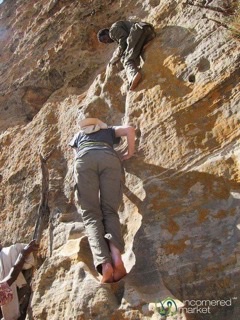
A perilous climb to Abuna Yemata Nuh https://www.thearchaeologist.org/blog/abuna-yemata-guh-the-most-inaccessible-place-of-worship-on-earth-is-located-in-ethiopia
One thing that caught my attention as I watched the first video is that there are well worn impressions in the sandstone where thousands of people have trod over the last almost two thousand years. Fortunately the Abuna Yemata Guh church also has a local guide and vanguards at every step of the climb, making sure visitors know which foothold to take and which rock to climb. They also help out with the ropes.
Learning about this church seemed very appropriate for me in the middle of my Advent journey. As I watched this second video of women bringing their infants to be baptized when they were just 40 days old, what struck me was the dedication of these mothers to their children and the desire to see them receive the most powerful and Godly blessing possible for their lives.
I think of the perilous journeys that Mary and Joseph took first when she was pregnant accompanying Joseph to Bethlehem. Then after Jesus’ birth the even more perilous journey into Egypt, I talked about this in a post I wrote last year entitled Why Don’t We Follow Joseph Mary and Jesus Into Egypt. Mary and Joseph were even more dedicated to the wellbeing of their child who they believed would one day become the Messiah so long before promised to the Jewish people. Their journeys were more dangerous and more disruptive of their lives than they ever imagined. I wonder if, when Mary and Joseph set out for Bethlehem from Nazareth they realized that they might not return to Nazareth for years. Did they, like so many refugees today have their lives unexpectedly and completely upended by the birth of Jesus?
As I watch the videos above and ponder my own journey of faith – now entering its 57th year, I realize that I was not prepared for the ways that this journey would totally upend and transform my life. There were many points at which I considered turning aside, but the call of God on my life was so strong and so insistent, that I could not do that. I suspect Mary and Joseph moved with the same sense of calling and the worshippers at Abuna Yemata Guh seem to as well. I wonder how often those climbing to the church to worship, felt like turning back. Did they find courage in the footsteps of those who had gone before? Did they find strength in the story of Mary and Joseph and especially from their long and perilous flight into Egypt which is so much at the heart of the Coptic church? There is so much that we can learn from ancient places and ancient traditions like this that hopefully draw us closer to the presence of God. However as I commented in my post last year: Why don’t we take more notice of this story and this important episode in Jesus life? Why don’t we take more notice of the Coptic church and their powerful traditions or of other churches established early in the history of Christianity?
I hope that you will take time this week to watch and reflect on the two videos above. Ask yourself: What risks am I willing to take to walk into the new life Christ offers? How dedicated am I to the journey towards Bethlehem, the birth of Jesus in my life and the even more perilous journey it starts me on? What kinds of distractions tempted me to turn aside from the path? Allow God to speak to you through these videos and consider your own faith journey in the light of them.
Just in time for the season of giving, we are offering beautiful giftable cookbook bundles! Pair our community cookbook with Graham Kerr’s classic The Gathering Place for the gourmand in your life. Or pair the cookbook with a copy of Christine Sine’s latest book Digging Deeper and a set of beautiful prayer cards. All the details are in the shop!
A contemplative service with music in the spirit of Taizé. Carrie Grace Littauer, prayer leader, with music by Kester Limner and Andy Myers. Some of you who live in Seattle might also be interested in the live Taize service Sunday December 18th at 5pm. Hopefully I will see you there.
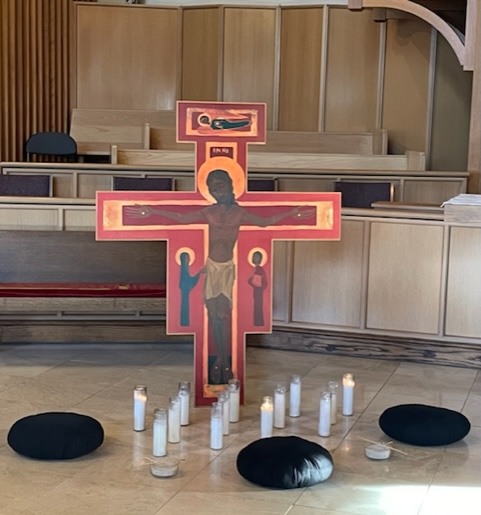
Taize style worship St Andrews Episcopal Church – photo Christine Sine
Thank you for praying with us at St Andrews Episcopal Church Seattle.
Permission to podcast/stream the music in this service obtained from One License with license #A-710-756.
“Lord Be With Us” (Kyrie)
Music and Lyrics by Kester Limner, shared under the Creative Commons License, Attribution (CC-BY)
“I Wonder As I Wander”
Public domain American folk hymn
Arrangement by Kester Limner, shared under the Creative Commons License, Attribution (CC-BY)
“Who put Joseph in the back of the stable? Who dressed him in brown, put a staff in his hand, and told him to stand in the back of the creche, background for the magnificent light of Mary?” (Ann Weems, Keeling in Bethlehem)
Poor Joseph. I’ve owned several creches over the years and every year when I set one of them up; it seems so unfair. The three kings have crowns. Mary and the angels have halos. Joseph just stands there. Plain. With no head covering and no special light, he fades into obscurity.
I once heard a true story about a church’s Christmas pageant from a colleague. On the night of the play, the pageant director came to the priest, panicked saying, “We have no Joseph! He’s called in sick.” The priest said calmly, “Just have one of the shepherds stand near the manger with Mary. Nobody will notice that Joseph is missing. He doesn’t have a speaking part.”
He doesn’t even have a speaking part. Maybe that’s why it is has been so easy to overlook Joseph. We are a culture that values words. Mary sang a song of joy when the angel told her she was going to have a baby. Zechariah prophesied at the circumcision rite for his son John the Baptist. And while I cannot imagine the Baptist singing; he could sure preach! As for Joseph? Not one word from the lips of Joseph is recorded in the Gospels.
At least churches who use the Revised Common Lectionary put a spotlight on Joseph every three years. This year on the 4th Sunday of Advent, December 18, we will again hear his story from the Gospel of Matthew (Matthew 1:18-23).
The story begins with his predicament. Imagine Joseph’s shock when he learns from Mary that she is pregnant! The news is even more shocking to him when Mary explains that the conception is “by the Holy Spirit.” In Franco Zeffirelli’s movie, Jesus of Nazareth, when Mary tells Joseph the good news, he says, “That’s too much for any man to believe.” And Mary says simply, “But you are not any man, you too are chosen.” We can imagine that Joseph would have preferred not to have been chosen at that moment.
His immediate solution, to rid himself of this particular nightmare, was to break off their engagement quietly. And to his credit he does not want Mary shamed in anyway. Technically, under Jewish law, Joseph could have called for justice. Mary could have been stoned to death. But instead of acting hastily he deliberates and sleeps, and then dreams. And what a dream!
An unexpected window opens and with it, divine light and guidance. God’s will for him is revealed. An angel of the Lord reassures Joseph that a higher purpose is at work. A new earth-shattering plan for humankind has begun and God needs Joseph to take his part in the unfolding drama. He is assured that his pregnant fiancé is in her condition by an act of God and is asked to accept her as his wife. Amazingly, Joseph does what is asked of him. He takes Mary as his wife even though she is pregnant. We speak of Mary’s surrender to God often. But what of Joseph’s surrender?
His response to God’s call is truly an act of faith, a radical faith. Joseph may have not been a man of words, but he was certainly a man of action. To marry a woman who was already pregnant and then to adopt her child knowing that the child was not of his own body was to break the law as stated in the Torah. The action he took on behalf of Mary and Jesus was contrary to his own religion’s beliefs. Putting aside the law of his Jewish faith, Joseph followed in the footsteps of the great prophet Hosea. He elevated compassion–his concern for Mary–above strict adherence to the law. Again, this was a radical move on his part!
Opting for compassion and relationship over punishment and separation, where else do we see Joseph’s behavior reflected in scripture? Who else cared more about people and less about keeping the letter of the law, as long as it continued to keep people marginalized? Yes. Sounds like Jesus to me.
Joseph’s action pre-figures the new justice of Jesus– compassion over religion. Jesus quotes Hosea twice in the Gospel Matthew, and both times the same citation: “I desire mercy, and not sacrifice” (9:13, 12:7). In other words, I desire compassion. This compassion-in-action is one that restored dignity to human beings who had been cast outside the shelter of the synagogue and the local community. Joseph’s act of saying yes to both God and Mary, made him the perfect role model for his adopted son, Jesus. Joseph reminds us of the important roles that fathers play in families.
Joseph had the courage to discern the inner authority of God’s calling to act with compassion. He had a dream, and based on that, he turned his life upside down. This is an invitation for us to consider taking our dreams, and our impulses that arise from prayer and meditation, seriously. How do we discern the inner authority of God speaking to us?
Decades ago, a man named John Sanford wrote a book called Dreams: God’s Forgotten Language. Sanford weaves together both biblical and psychological sources, and draws the conclusion that our dreams can be from God.
He writes,
We have decided that a person may find God everywhere except in our own soul, which is in fact the fountainhead of religious experience. More often than not, as Christians, we want creeds, not religious experience, we want dogma not inspiration. We much prefer the security of our rationality to the awesome experience of dealing with a living voice.
Like Joseph, what might happen if we trusted that our own inner experiences are of divine origin? What would happen if we were able to take compassionate and radical actions by trusting the living voice? What if we trusted that our bodies and souls are temples for the Holy Spirit- that indeed God-is-with us? Wouldn’t we become more equipped to live as the people of God? Compassionate. Loving. Just. Can we learn to trust as Joseph he did-that divinity is born in the most unlikely of places?
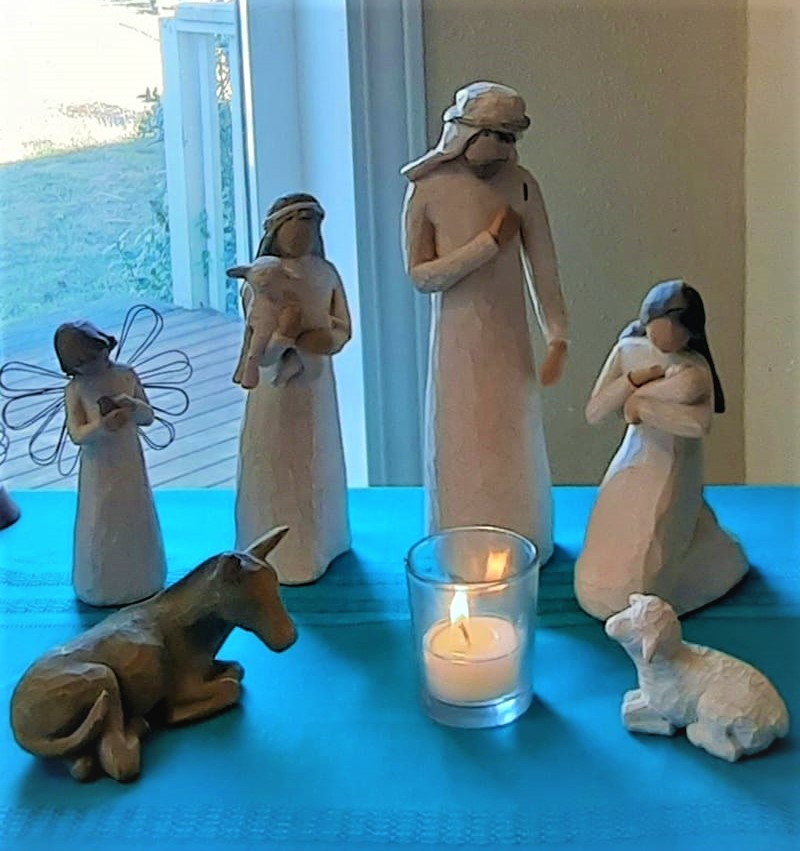
Ananda Creche
This Advent and Christmas is a good time to remember and give thanks for the life and ministry of Joseph. Invite Joseph into your prayer. Be on the look-out for the images of Joseph in this life: the single father, the adopting father, the “stay at home” father. Keep an eye out for robust images of Joseph in art, drama and literature. For he, like Mary and Jesus, certainly shone with God’s light and love. The Holy Family invites us to do the same. May we too become living lights of God’s love and compassion.
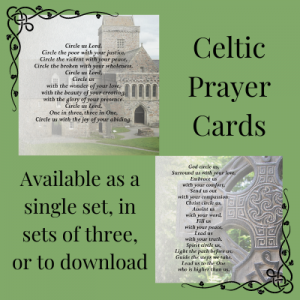 Celtic Prayer Cards include 10 prayers inspired by ancient Celtic saints like Patrick or contemporary Celtic writers like John O’Donohue. A short reflection on the back of each card will introduce you to the Celtic Christian tradition, along with prayers by Christine Sine and beautiful imagery crafted by Hilary Horn. Celtic Prayer Cards can be used year-round or incorporated into various holidays. Available in a single set of 10 cards, three sets, or to download.
Celtic Prayer Cards include 10 prayers inspired by ancient Celtic saints like Patrick or contemporary Celtic writers like John O’Donohue. A short reflection on the back of each card will introduce you to the Celtic Christian tradition, along with prayers by Christine Sine and beautiful imagery crafted by Hilary Horn. Celtic Prayer Cards can be used year-round or incorporated into various holidays. Available in a single set of 10 cards, three sets, or to download.
This week I hosted a Sacred Space Prayer Experience at a local coffee shop Humphreys Street Coffee. I’ve wanted to curate a space like this here in Nashville for many years and in this particular place because I love their mission and their coffee! For there days, Sacred Space was an open house for God and my gift to the community. People could pop in to create something in art, pray the stations or just sit and read a book or rest from the busyness of the season. The theme of the Sacred Space was RECEIVE THE GIFT. All the prayer stations were based around gifts and used bows, wrapping paper, and small gift packages as decorations or props to pray with. If you’ve heard of Montessori School, a Sacred Space is like Montessori Church. It involves participation. Each station had something to do or experience. Like putting on baby lotion as a reminder to receive the gift of baby Jesus.

Sacred Space

Sacred Space
The Sacred Space begins with this prayer
December is
the Season of Gifts…
The Season of both Giving and Receiving
Today you are invited to RECEIVE .
Today be open to Receiving …
The Gift of Space and Time to slow down & be still.
The Gift of Hope for a world that often feels hopeless.
The Gift of Peace for a world filled with conflict.
The Gift of Light that comes to our darkness.
The Gift of a Baby King born in the messiness of life
to a teenage girl
The Gift of Emmanuel…God is with us!
What Gifts are you looking for today?
What hopes, dreams, plans, prayers have you been waiting for, longing for,
Waiting for them to be fulfilled?
Consider & pray about what gifts you might receive today. RECEIVE THE GIFT!
We are almost to Christmas…the last week of Advent. The Gift of Jesus is almost here! It’s that time of year when gifts are being finalized and wrapped for under the tree.
Wrapping gifts is a great opportunity for prayer! Gift wrapping is the perfect prayer practice!

Grab a Gift and wrapping supplies. As was you wrap it, talk to God about the Gifts you are longing for in your life.
As you wrap the Gift…
Invite Jesus to rap you in his great love. Ask Jesus to help you truly feel his love and peace surrounding you like the paper surrounds the present.
How have you felt wrapped in God’s love ? Take time to be grateful all the gifts of love you’ve experienced lately. Friends, family, things that have made you smile, etc
As you stick on the scotch tape…(sellotap), consider what is keeping you stuck in your life? What things keep you stuck in your relationship with Jesus? Talk to him about these sticky things and allow Jesus to have the stuckness and set you free!
Bows and ribbons remind me of celebrations…What are the things you have been celebrating this Advent? What things are you grateful for? Thank God for these things that are bringing you joy!
Finally, pray for the person the gift is for. As you write the card or gift tag, ask Jesus to help this person receive the Gift of God’s great love this Christmas.
When you open a gift during the holidays, consider what Gifts God is inviting you to open.. What are the new and maybe even the unexpected Gifts God has for you this final week of Advent? Ask God to show you. Take time to notice.
Use the gift packages you see, under the tree, in shops and even on tv commercials to remind you of all the Gifts God has given you and to remind you of the greatest Gift…JESUS.

Give yourself or a friend the gift of a retreat in the new year…Following the Star into the New Year on January 7 on line or Finding Your Thinplace Retreat February 7-10 in Person in Wine Country.
©lillylewin and freerangeworship.com
Just in time for the season of giving, we are offering beautiful giftable cookbook bundles! Pair our community cookbook with Graham Kerr’s classic The Gathering Place for the gourmand in your life. Or pair the cookbook with a copy of Christine Sine’s latest book Digging Deeper and a set of beautiful prayer cards. All the details are in the shop!
Gabriel’s Annunciation
For a moment
I hesitated
on the threshold.
For the space
of a breath
I paused,
unwilling to disturb
her last ordinary moment,
knowing that the next step
would cleave her life:
that this day
would slice her story
in two,
dividing all the days before
from all the ones
to come.
The artists would later
depict the scene:
Mary dazzled
by the archangel,
her head bowed
in humble assent,
awed by the messenger
who condescended
to leave paradise
to bestow such an honor
upon a woman, and mortal.
Yet I tell you
it was I who was dazzled,
I who found myself agape
when I came upon her—
reading, at the loom, in the kitchen,
I cannot now recall;
only that the woman before me—
blessed and full of grace
long before I called her so—
shimmered with how completely
she inhabited herself,
inhabited the space around her,
inhabited the moment
that hung between us.
I wanted to save her
from what I had been sent
to say.
Yet when the time came,
when I had stammered
the invitation
(history would not record
the sweat on my brow,
the pounding of my heart;
would not note
that I said
Do not be afraid
to myself as much as
to her)
it was she
who saved me—
her first deliverance—
her Let it be
not just declaration
to the Divine
but a word of solace,
of soothing,
of benediction
for the angel
in the doorway
who would hesitate
one last time—
just for the space
of a breath
torn from his chest—
before wrenching himself away
from her radiant consent,
her beautiful and
awful yes.
Jan Richardson is an artist, author, United Methodist minister, and director of The Wellspring Studio, LLC. Widely known for her distinctive intertwining of word and image, Jan blogs at The Painted Prayerbook.
Check out her her latest Women’s Christmas retreat – A Path Called Solace
Or attend our next retreat – Following The Star Into the New Year
In January we celebrate Epiphany and the coming of the Magi to visit Jesus. Like them, many of us feel we are on a long journey following a star that is sometimes bright and shining, sometimes completely hidden yet still guiding us towards Christ. 2022 taught us important lessons that will shape the coming year. We sense God wants to do something new in our lives and we want to follow in the right direction.
Join Lilly Lewin and Christine Sine online Saturday, January 7th 2023 from 9:30 am PT to 12:30pm PT as they help us reflect on the past year and take time to hope, dream and pray for the year ahead. We will engage in some fun practices like chalking the door and interact with each other in ways that strengthen our faith and draw us closer to God.
Click here to register! We are once again offering several price points to aid those who are students or in economic hardship.
He could not have been busier. Bethlehem was bulging at the seams, under the weight of all the extra people in town for the census. He loved it when the inn was full and noisy and vibrant with chatter. People. He was definitely a people person. He did his very best for his customers – he cared about their opinions and their needs, and of course, his reputation.
It had been a bit unusual, but at the time, he had thought nothing of it. He had been in a rush as usual. He had put them in the outhouse where he stabled the donkey and the goats – what else could he have done? At least it was dry there and fairly private. From the looks on their faces, it seemed that their baby was on its way.
Oh God – when have I relegated you to an outer room? I know that I sometimes leave you on the sidelines, while I busy myself with seemingly ‘more important things’, juggling one distraction with another as they vie for my attention and time. Forgive me when I fail to remember that you alone ground me, you define me, you sustain me. Not the other stuff.
Quietly, tucked out of the way on the edge and in the margin, Jesus slipped into our world 2000 years ago. Now, in this year marked by war and uncertainty, by rising prices and environmental challenges, as again we celebrate God with us may we not fail to see that His resurrected presence woos us and beckons us into a refuge of intimacy and revelation. The God child – the only rock in a world framed by instability and chaos.
Is there really no room for more of Him in my little life? Or is it that there is no more room for Him at all?
I allow these thoughts to tumble over themselves in my mind.
Have I dismissed the whisperings of something more, something bigger, and beyond? Am I too content with the little that I’m familiar with? …the crumbs under the table, when He has laid before me a feast.
As in that most famous of all birth stories, God today continues to hide himself in plain sight, waiting, longing even to be sought and found. ‘Draw near to me, and I will draw near to you’. Perhaps we have drawn as close as we can bear, but then, again perhaps we have not…
Let’s determine to move over, make some space and place more importance on coming in closer to the Saviour – taking time to listen, to watch, to be awed, to be reminded. Not rushing away.
I will make room. I must make room.
In January we celebrate Epiphany and the coming of the Magi to visit Jesus. Like them, many of us feel we are on a long journey following a star that is sometimes bright and shining, sometimes completely hidden yet still guiding us towards Christ. 2022 taught us important lessons that will shape the coming year. We sense God wants to do something new in our lives and we want to follow in the right direction.
Join Lilly Lewin and Christine Sine online Saturday, January 7th 2023 from 9:30 am PT to 12:30pm PT as they help us reflect on the past year and take time to hope, dream and pray for the year ahead. We will engage in some fun practices like chalking the door and interact with each other in ways that strengthen our faith and draw us closer to God.
Click here to register! We are once again offering several price points to aid those who are students or in economic hardship.
When will the funeral be?
When can we get together for coffee?
When will you come back to worship at the church?
When will you be ready to speak in person?
When? When? When? When?
Since my husband’s passing last February, the questions have kept coming—questions from others and questions that I ask myself.
At times I’ve had an answer: “Instead of a gathered funeral during the pandemic, there will be an online tribute.” At times I’ve responded with another question: “Could we go for a walk instead?” Or “Could we meet for ice cream at the park?” Sometimes I’ve put off answering: “I can’t even think about that right now.” Or more simply, “I don’t know.”
In the midst of the many questions, I’ve also been told many times, “You’ll know when you’re ready.” When one pastor lost his wife to cancer, he took six months off before resuming his ministry at the church. Another took a year. Others take a few weeks or months. Some return part-time. Some end up changing churches. Perhaps they were also told, “You’ll know when you’re ready.”
I’m not so sure I’ll know when I’m ready for the different invitations and opportunities that await my answer. Or if I will ever feel ready for them.
When my husband asked me to marry him when we were both just eighteen years old and in our first year of university, was I ready then? Now when I look at eighteen-year-olds, I think I must have been too young. When I was called into pastoral ministry on an interim basis, when I received a continuing term as a lead pastor, when I was ordained—at each step along the way, I remember thinking, “This church seems more ready than I am for my new role and responsibilities.”
I wasn’t ready for my husband to be diagnosed with cancer the first time, or the second time. I wasn’t ready for his long hospital stay during the pandemic. I wasn’t ready for him to die suddenly in February. It still seems sudden to me, and I’m still not ready to be without him.
Yet here I am. Ready or not.
That’s true for so much in life. Things come to us unbidden. Life happens when we’re busy doing other things and turns us around. And around and around, even when we’re not ready.
Some time ago, I read a newspaper interview with William Shatner. The 91-year-old actor was celebrating the release of his latest book, Boldly Go Reflections on a Life of Awe and Wonder (Atria Books, 2022). When asked about the death of his wife, Nerine, he said his voice trembled when he answered—even though her death was over twenty years ago. The host said, “It never goes away, does it?”
He replied, “It doesn’t. Grief is a palpable entity in the human experience. Grief has sides to it. Depending on how you deal with it, it can be assuaged. But it never goes away.”
When asked about his successful and varied career as an actor, producer, screenwriter, author, and space tourist, he said that he hadn’t planned any of it. “I feel that life is so chaotic that there is no chance of organizing it,” he said. “Life organizes you.”
So this year I’m not organizing Christmas. I’m not organizing Advent. I’m not organizing my grief. I’m letting those things organize me. I’m not ready for Christmas—or maybe I am, and I just don’t know it. But ready or not, I say with Mary, “Here am I, the servant of the Lord; let it be with me according to your word” (Luke 1:38).

Christine Sine’s book The Gift of Wonder is a welcome respite in our harried world. Journey along with Christine in the Gift of Wonder Online Retreat as she guides you through creative practices to recapture your delight in God. Learn more here, or purchase the book from our shop!
As an Amazon Associate, I receive a small amount for purchases made through appropriate links.
Thank you for supporting Godspace in this way.
When referencing or quoting Godspace Light, please be sure to include the Author (Christine Sine unless otherwise noted), the Title of the article or resource, the Source link where appropriate, and ©Godspacelight.com. Thank you!


 Cookbook Bundles
Cookbook Bundles